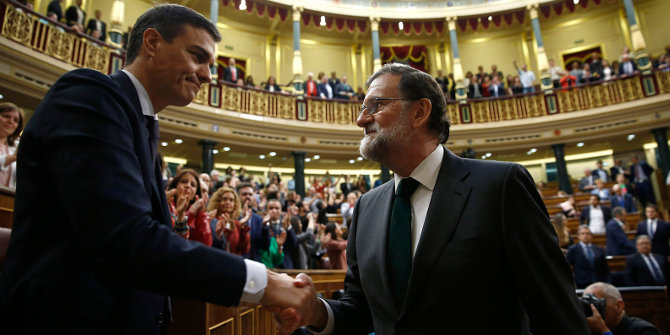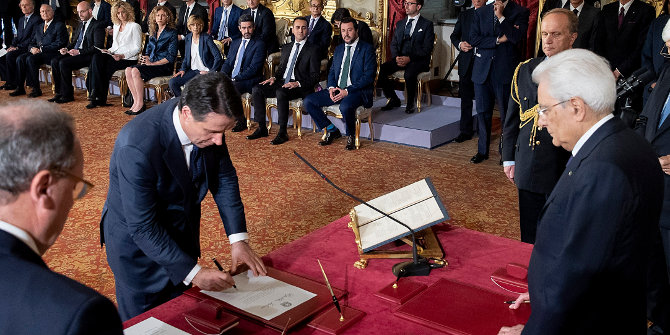 For the last decade, Austria has been the only country in the EU that allows voting at the age of 16 at all political levels. Paul Schmidt assesses whether this could offer a future model for the EU, and the possible lessons that can be learned from the Austrian experience.
For the last decade, Austria has been the only country in the EU that allows voting at the age of 16 at all political levels. Paul Schmidt assesses whether this could offer a future model for the EU, and the possible lessons that can be learned from the Austrian experience.
With the next elections to the European Parliament around the corner, it’s about time we discussed giving Europe`s youth a stronger say in the debate on the future of Europe. One way of doing so is lowering the voting age to 16, which to be successful needs to be accompanied by various supporting measures. Austria is the only country in the EU which has done so. But how much can other EU countries learn from the Austrian experience?
Discussions about reforming Europe are just getting started. But can the younger generation co-decide which path European integration should take? Clearly not: decisions are still driven first and foremost by the views of middle-aged or old men. The possibilities for the next generation to define their own future seem rather limited. If this was a rule of thumb, there could nevertheless be one small exception. In 2007, Austria lowered the voting age from 18 to 16 for elections at all political levels. It is the only EU country with experience in direct youth participation and thus an interesting case study to look at.
Just a few weeks ago, the Maltese Parliament decided to follow Austria by lowering its general voting age to 16. In Germany, at least some of the “Länder” allow those aged 16 to participate in regional elections, and in Scotland they are entitled to cast their vote at regional parliamentary elections. The European Commission, for its part, has considered proposing a lowering of the general voting age to boost youth participation in European Citizens Initiatives. So, there is a trend, which is potentially becoming fashionable, and other countries may consider drawing from the Austrian example.
Nevertheless, slightly more than ten years after reforming its electoral system, the Austrian case is not that clear cut. The country has not yet achieved the goal of a sustainable high and increasing youth turnout. The electoral turnout of first-time voters has been fluctuating and, according to collected data of the Austrian National Election Study, obviously depends on a variety of factors. Still, there is evidence that the starting effect at the general elections of 2008, where 16-year-olds were given the right to participate for the first time, was a positive one. In the aftermath though, it ran into difficulties mainly due to decreasing public attention.
Yet, the current Flash Eurobarometer European Youth equally ranks Austria and Italy in first place regarding the electoral turnout of young voters between 15 and 30 years. Around 79 per cent of Austrian youth stated they had participated in local, regional or national elections in the last three years, the European average being 64 per cent.
In addition, the political interest of the younger generation has definitely increased between the general election of 2013 and 2017. To support this trend, the country needs to provide permanent curricular as well as extra-curricular support measures. In this context, a long-term strategy of educational centres, but also of political decision makers and opinion leaders, would be key. The introduction of, for example, political education as a proper subject for all types of schools, together with an adequate apprenticeship and in-service training for teachers in this field, has long been recommended and should accompany these changes. Teachers need to be aware of state-of-the-art teaching tools regarding political participation.
It is fair to say that the younger generation is on average more pro-European than the generation of their parents or grandparents. To integrate them into the political decision-making process at an earlier stage could thus be a favourable element to preserve European cohesion. The intuitive pro-European attitude of the young needs to be complemented with concrete knowledge and personal experiences. One way of doing this is to give them the possibility to raise their voice and have a say regarding the future, thereby getting young citizens engaged in a fair and balanced dialogue about the pros and cons of European integration, as well as the challenges ahead.
For more information on this topic, an accompanying policy brief has been published at the Elcano Royal Institute
Please read our comments policy before commenting.
Note: This article gives the views of the author, not the position of EUROPP – European Politics and Policy or the London School of Economics. Featured image credit: Ed Yourdon (CC BY-NC-SA 2.0)
_________________________________
 Paul Schmidt
Paul Schmidt
Paul Schmidt is Secretary General of the Austrian Society for European Politics.






Yes Im sure treating adolescents as adults even earlier will surely help them in the long term….lol.